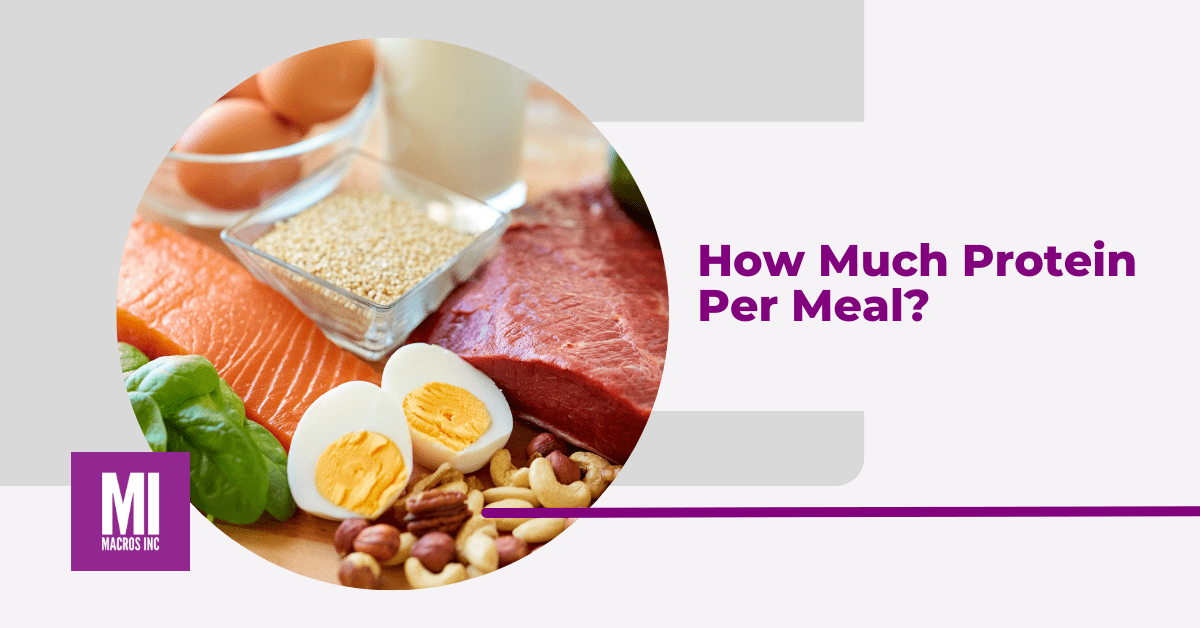Timing and protein per meal is minimally important when compared to getting total daily protein intake.
If you reach your daily protein targets consistently, then the next step is to aim for 25-40 grams of protein per meal spread out evenly every 4-6 hours throughout the day
Protein should be evenly distributed throughout the day with 25-40g of high-quality protein containing 2-3g of leucine. It has been suggested that 0.4g – 0.5g of protein / kg of body weight / meal will max out muscle protein synthesis.
Introduction
Protein plays a crucial role in supporting our overall health and wellness. From muscle building and repair to weight management and satiety, its benefits are undeniable. But how much protein should we consume per meal?
In this post, we’ll explore the optimal amount of protein to include in each meal, debunk common myths, and provide practical guidelines to help you find the perfect balance for your nutrition according to your goals.
Understanding Protein and Its Functions
Proteins are essential macronutrients composed of amino acids. They are involved in various bodily functions, including enzyme production, hormone regulation, and immune system support. Protein can be derived from animal-based sources like meat, fish, and dairy, as well as plant-based sources like legumes, grains, and nuts. Incorporating an adequate amount of protein into our diets is vital for overall health.
Factors Influencing Protein Requirements
Several factors influence an individual’s protein needs. Age, sex, body weight, physical activity level, and overall health play a significant role in determining the optimal protein intake. Additionally, protein turnover, the continuous breakdown and synthesis of proteins in the body, affects our protein requirements. It’s important to understand that more protein isn’t always better; finding a balance based on your specific needs is key.
How Much Protein per Meal Should You Eat?
To distribute protein intake evenly throughout the day, aim for 25-40 grams of high-quality protein per meal. This balanced approach ensures a steady supply of amino acids for muscle repair and growth.
Let’s consider an example: If your daily protein goal is 120 grams, you can divide it into three meals, aiming for 40 grams of protein in each. Incorporating lean meats, dairy products, or plant-based proteins into your meals can help achieve this target.
The Optimal Amount of Protein per Meal
Research suggests that consuming around 0.4-0.5 grams of protein per kg of body weight per meal maximizes muscle protein synthesis (MPS). Therefore, reaching this threshold per meal is sufficient to stimulate muscle growth and repair. Additionally, it’s important to include 2-3 grams of leucine, an essential amino acid found in high-quality proteins, to enhance MPS.
Protein Needs for Older Adults
As we age, our bodies become less efficient at utilizing dietary protein. Therefore, older adults, especially men, may require a higher protein dose of up to 40 grams per meal. This higher intake helps counteract age-related muscle loss and maintain muscle mass. Including protein-rich foods like poultry, fish, eggs, or plant-based protein sources can support the unique protein needs of older individuals.
Dispelling the Myth of Protein “Waste”
Contrary to popular belief, consuming more than 35 grams of protein per meal does not result in wasted protein. While muscle protein synthesis may not increase beyond a certain threshold, the additional protein is still utilized by the body.
It becomes part of the amino acid pool, which can be oxidized for energy or used for protein synthesis in other cells and tissues. So rest assured, the extra protein you consume has its place within your body.
Supporting Research and Studies
Studies have shown that ingesting 40 grams of protein stimulates muscle protein synthesis to a greater extent than consuming 20 grams. A 2015 study comparing the effects of 40 grams and 70 grams of protein on muscle protein synthesis found no significant difference in MPS between the two groups. While higher protein intake resulted in a greater overall protein balance, the focus should remain on reaching the optimal protein threshold for MPS.
In Summary
Finding the right balance of protein per meal is crucial for supporting optimal health and fitness goals. Distributing protein intake throughout the day, aiming for 25-40 grams of protein per meal, and including 2-3 grams of leucine can maximize muscle protein synthesis.
Remember, individual protein needs may vary based on factors such as age, sex, and activity level. For personalized guidance on protein requirements and dietary planning, consult with a healthcare professional or registered dietitian. Let’s fuel our bodies with the right amount of protein and achieve our wellness goals.
References
- The anabolic response to a meal containing different amounts of protein is not limited by the maximal stimulation of protein synthesis in healthy young adults.
- Postexercise net protein synthesis in human muscle from orally administered amino acids.
- Smith-Ryan, Abbie E.; Antonio, Jose (2013). Sports Nutrition & Performance Enhancing Supplements. Ronkonkoma, NY: Linus Learning. p. 43. ISBN 978-1-60797-339-3.

